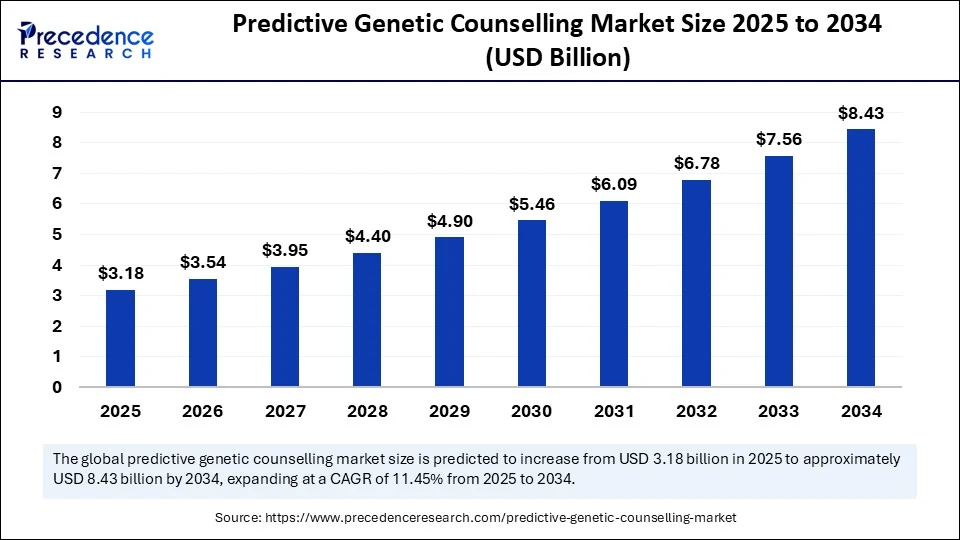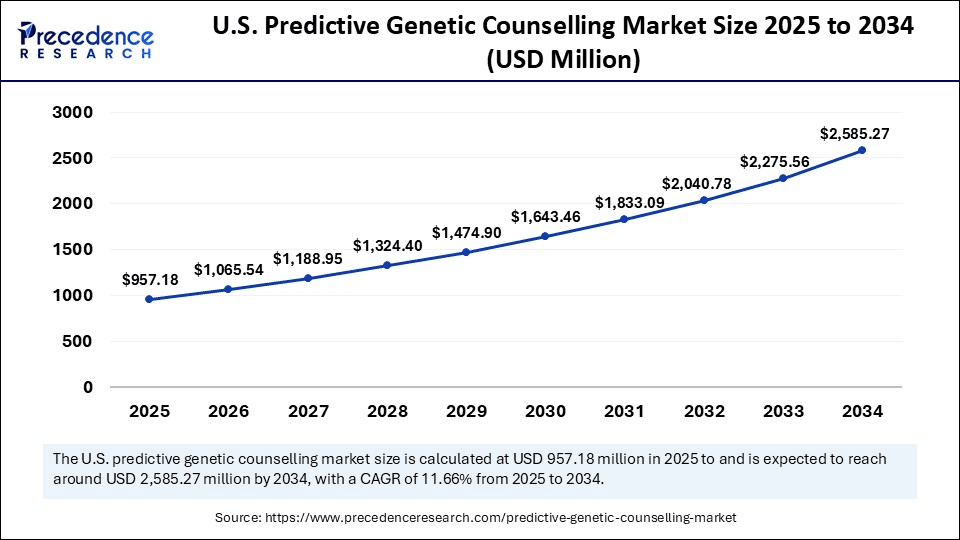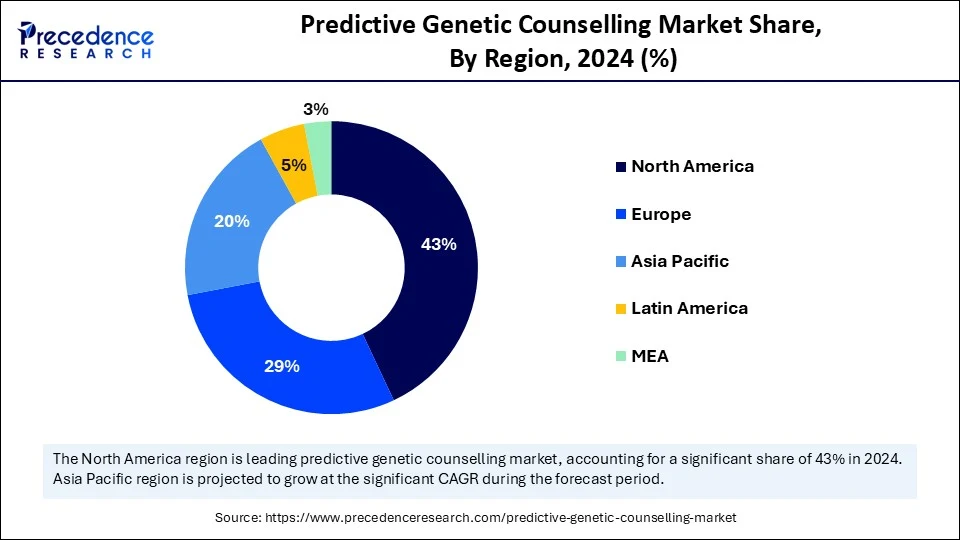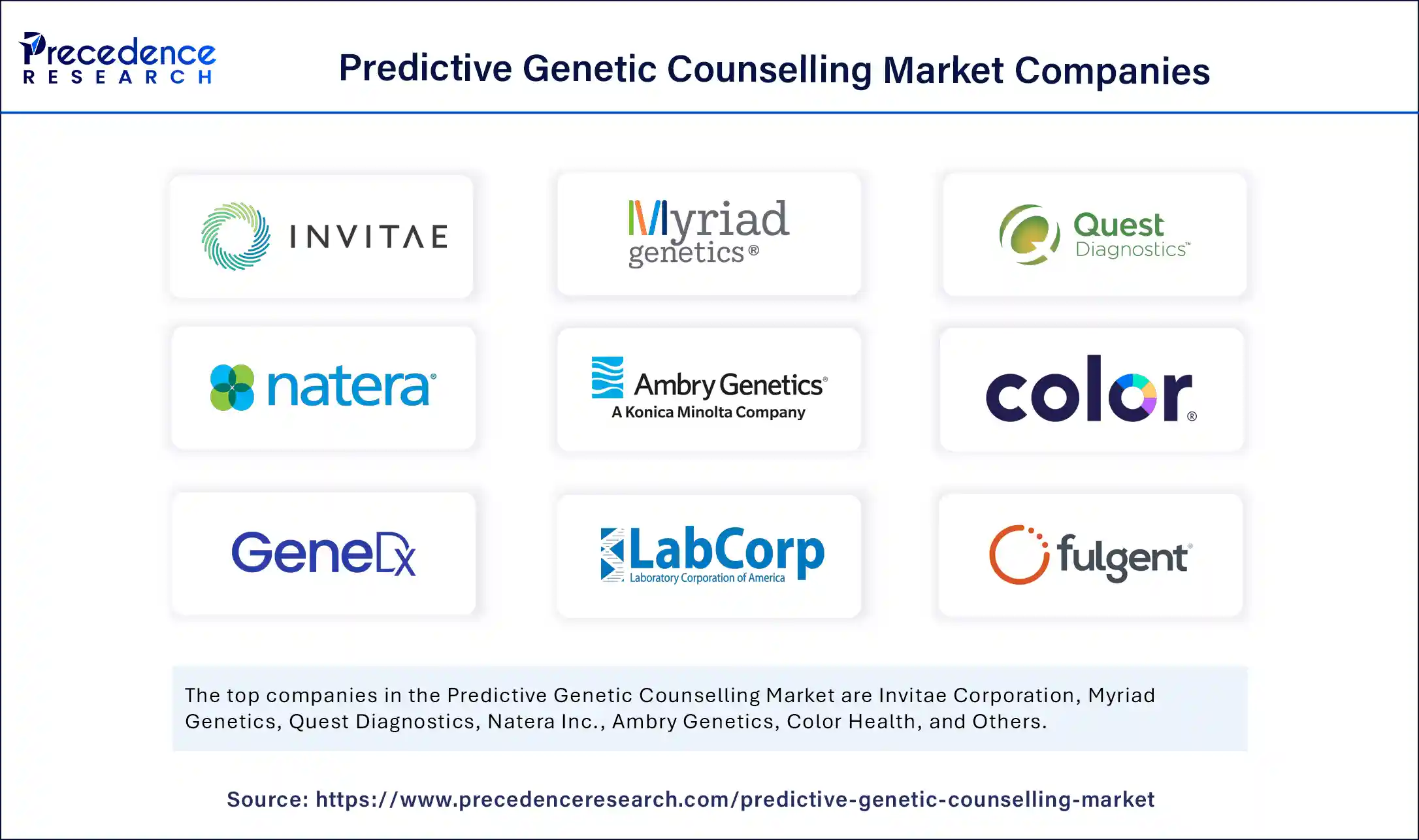Predictive Genetic Counselling Market Size and Forecast 2025 to 2034
The global predictive genetic counselling market size accounted for USD 2.85 billion in 2024 and is predicted to increase from USD 3.18 billion in 2025 to approximately USD 8.43 billion by 2034, expanding at a CAGR of 11.45% from 2025 to 2034. It combines clinical genetics, risk assessment, and psychological support to guide patients in making informed decisions about their health and future.

Predictive Genetic Counselling MarketKey Market Takeaways
- In terms of revenue, the global predictive genetic counselling market was valued at USD 2.85 billion in 2024.
- It is projected to reach USD 8.43 billion by 2034.
- The market is expected to grow at a CAGR of 11.45% from 2025 to 2034.
- North America dominated the chemical predictive genetic counselling market with the largest market share of 43% in 2024.
- By region, the Asia Pacific is anticipated to grow at the fastest CAGR during the forecast period.
- By service type, the risk assessment counseling segment held a biggest market share in 2024.
- By service type, the pharmacogenomic counseling segment is expected to grow at the fastest CAGR during the forecast period.
- By service delivery mode, the in-person counseling segment accounted for a considerable share in 2024.
- By service delivery mode, the tele-genetic counseling segment is projected to experience the highest growth CAGR between 2025 and 2034.
- By end-user type, the hospital segment contributed the highest market share in 2024.
- By end-user type, the diagnostic & genetic testing laboratories segment is set to experience the fastest CAGR from 2025 to 2034.
- By application area type, the oncology segment generated the major market share in 2024.
- By application area type, the reproductive health segment is projected to expand rapidly during the forecast period.
How AI Is Reshaping the Predictive Genetic Counselling Market?
Artificial intelligence (AI) is significantly transforming the predictive genetic counselling market by enhancing speed, accuracy, and accessibility. AI-powered platforms can analyse massive datasets of genetic information, identifying risk patterns faster than traditional methods. This enables counsellors to provide highly precise and personalized recommendations to patients. Machine learning algorithms are also being used to predict disease progression, aiding in more effective preventive strategies. Virtual AI-based assistants are streamlining pre-counselling processes by gathering patient histories and offering educational insights. Additionally, AI is helping bridge the counsellor shortage by enabling remote and scalable counselling solutions. As AI continues to evolve, it is expected to shift genetic counselling from a niche specialty to a widely accessible, tech-enabled healthcare service.
- In April 2025, Gerhard Bauer, former director of the UC Davis GMP manufacturing facility and co-author of a recent study on cell and gene therapy production in the United States, noted that although new manufacturing technologies are being developed, their integration into large-scale commercial production remains limited. Established, reliable processes that have been in use for many years continue to dominate the manufacturing landscape.(Source: https://www.genengnews.com)
U.S. Predictive Genetic Counselling Market Size and Growth 2025 to 2034
The U.S. predictive genetic counselling market size was exhibited at USD 857.85 million in 2024 and is projected to be worth around USD 2,585.27 million by 2034, growing at a CAGR of 11.66% from 2025 to 2034.

Why Is North America Leading the Predictive Genetic Counselling Market?
By region, North America dominated the global market in 2024, driven by advanced healthcare infrastructure and high consumer awareness. The U.S. is home to major genetic testing companies, research centers, and specialized counselling services that support market leadership. Strong insurance coverage and government-backed genetic screening programs further accelerate adoption. Additionally, the presence of a large base of trained genetic counsellors gives North America a competitive edge. Growing integration of predictive counselling into oncology, reproductive health, and chronic disease management has made the region a global hub. As demand for personalized healthcare increases, North America is expected to maintain its dominance in the foreseeable future.
- In February 2025, for the first time, a team of geneticists from the University of Pittsburgh School of Public Health demonstrated that a gene silencer located within so-called junk DNA can directly protect individuals from a severe and fatal progressive neurological disorder.(Source: https://www.health.pitt.edu)

Why Is Asia Pacific the Fastest-Growing Predictive Genetic Counselling Market?
Asia Pacific is the fastest-growing region in the predictive genetic counselling sector, attributable to increasing awareness and expanding healthcare investments. Countries like China, India, and Japan are witnessing rising demand for genetic testing and counseling, fueled by urbanization and a higher prevalence of hereditary diseases. Governments are also initiating national screening programs and collaborations with global biotech firms. The adoption of digital health platforms and tele-genetic counseling is bridging accessibility gaps in rural and semi-urban areas. Cultural shifts toward preventive healthcare are further encouraging families to seek predictive counseling. With a young population and growing disposable incomes, the Asia Pacific presents a massive untapped market that is expected to outpace global growth rates in the coming years.
Market Overview
The predictive genetic counselling market refers to services provided by genetic counselors and healthcare professionals to assess an individual's risk of developing inherited diseases or conditions before symptoms occur. This involves evaluating family history, genetic testing, and providing guidance for preventive healthcare, reproductive decisions, and lifestyle modifications.
The predictive genetic counselling market is witnessing steady expansion driven by increasing awareness of genetic testing and preventive care. A growing number of individuals are opting for predictive screening to assess risks of cancers, cardiovascular conditions, and neurological disorders. Healthcare providers are integrating genetic counseling into clinical pathways, making it a standard recommendation for patients with a family history of disease. The market is also supported by the rising incidence of lifestyle-related disorders, which heightens the relevance of risk prediction. Furthermore, insurance coverage in developed economies is encouraging more patients to consider genetic counseling services. With advancements in precision medicine, the role of predictive counseling is evolving from optional to essential, making it a central component of personalized healthcare.
Market Key Trends
- Growing integration of genetic counselling into oncology and reproductive medicine.
- Expansion of tele-genetic counselling platforms for remote accessibility.
- Increasing collaborations between biotech firms, diagnostic labs, and counselling providers.
- Rising focus on multi-gene panel testing and whole-genome sequencing.
- Consumer demand for direct-to-consumer (DTC) genetic counselling services.
- Adoption of AI-driven decision-support tools for counsellors.
Market Scope
| Report Coverage | Details |
| Market Size by 2034 | USD 8.43 Billion |
| Market Size in 2025 | USD 3.18 Billion |
| Market Size in 2024 | USD 2.85 Billion |
| Market Growth Rate from 2025 to 2034 | CAGR of 11.45% |
| Dominating Region | North America |
| Fastest Growing Region | Asia Pacific |
| Base Year | 2024 |
| Forecast Period | 2025 to 2034 |
| Segments Covered | Service Type, Service Delivery Mode, End-User, Application Area, and Region |
| Regions Covered | North America, Europe, Asia-Pacific, Latin America, and Middle East & Africa |
Market Dynamics
Drivers
Why Preventive Care Is Fueling Demand for the Predictive Genetic Counselling Market?
The predictive genetic counselling sector is primarily influenced by the global shift toward preventive healthcare. Individuals and families are increasingly recognizing the benefits of identifying genetic risks before disease onset. Predictive genetic counselling empowers people to make lifestyle changes, undergo early screenings, or consider preventive treatments tailored to their genetic profile. Governments and healthcare systems are also advocating for genetic screening programs to reduce long-term healthcare costs. Moreover, rising awareness of hereditary conditions such as BRCA-related breast cancer and Huntington's disease is encouraging at-risk populations to seek counselling. The ability to offer both medical insights and emotional support strengthens the appeal of these services. Ultimately, the emphasis on prevention rather than treatment is accelerating the adoption of predictive genetic counselling worldwide.
A recent study by MapMyGenome stated that in today's today's rapidly advancing healthcare landscape, predictive genetic testing has become a transformative tool for assessing an individual's risk of developing certain health conditions before they appear. By examining a person's genetic profile, this approach provides critical insights into potential disease predispositions, empowering proactive prevention strategies and fostering more personalized healthcare solutions(Source: https://mapmygenome.in)
Restraint
What Challenges Are Slowing Widespread Adoption?
The predictive genetic counselling market experiences growth restraints due to factors such as limited awareness in low- and middle-income countries restricts adoption beyond urban centers. The shortage of trained genetic counsellors is another major bottleneck, especially as demand outpaces supply. Ethical and privacy concerns related to genetic data handling also hinder widespread acceptance. Additionally, the high cost of genetic tests and counselling services limits affordability for many patients. In some regions, cultural stigmas associated with genetic disorders discourage families from seeking counselling. Addressing these barriers will require a combination of policy reforms, awareness campaigns, and innovative technology-driven solutions to democratize access.
Opportunity
Is Personalized Machine Learning Opening New Doors?
Key growth avenues in the predictive genetic counselling market include therapies becoming increasingly tailored to genetic profiles, and counseling services are essential to guide patients through complex choices. Pharmaceutical companies are partnering with counselling providers to enhance patient adherence and treatment success. Emerging markets are also opening up opportunities, as improved awareness and healthcare investments expand access to predictive testing. Additionally, the growing popularity of direct-to-consumer genetic kits is creating demand for professional interpretation, bridging the gap between raw genetic data and actionable health decisions. Digital health platforms integrating genetic counselling are further extending market reach, especially among younger, tech-savvy consumers. As personalized medicine evolves, predictive genetic counselling will remain at the heart of patient-centered healthcare solutions.
A study led by UCL researchers reveals that living in a family with a genetic risk of dementia strongly influences decisions around having children and parenting approaches. Published in the Journal of Genetic Counselling, the research involved interviews with 13 individuals, both parents and non-parents, who face the risk of developing familial frontotemporal dementia.
Service Type Insights
Why Risk Assessment Counseling Is Dominating the Predictive Genetic Counselling Market?
The risk assessment counseling dominated the predictive genetic counseling industry, following predictive genetic counseling, providing patients with comprehensive evaluations of their susceptibility to hereditary conditions. These services enable individuals to make informed lifestyle, preventive, and treatment decisions based on genetic risk factors. Counselors leverage detailed family histories, clinical data, and genetic test results to deliver accurate assessments. The focus is not only on identifying potential health risks but also on guiding patients through proactive interventions. Hospitals and specialized clinics often rely heavily on risk assessment counselling to integrate preventive strategies into patient care. Its established efficacy and broad applicability continue to reinforce its leading position.
The pharmacogenomic counseling is the fastest-growing in the predictive genetic counseling sector, owing to the rise of personalized medicine. By analyzing how genetic variations influence drug metabolism and response, counselors can help optimize medication selection and dosing. This approach reduces adverse reactions and improves treatment efficacy across diverse patient populations. Increasing awareness among healthcare providers and patients regarding precision therapeutics is fueling adoption. Additionally, the integration of pharmacogenomics into oncology, cardiology, and psychiatry enhances its relevance. As more genetic tests become accessible and cost-effective, pharmacogenomic counseling is poised for rapid growth.
Service Delivery Mode Insights
Why In-Person Counseling Led the Predictive Genetic Counselling Market?
In-person counseling led the predictive genetic counseling industry, driven by delivery mode, offering patients direct interaction with trained genetic counselors. Face-to-face consultations allow for nuanced communication, immediate clarification of patient concerns, and personalized guidance. Hospitals and specialty clinics continue to prioritize in-person sessions for high-risk cases or complex assessments. The traditional format also strengthens trust and rapport between counselors and patients, enhancing adherence to recommended interventions. Established protocols and infrastructure in healthcare facilities support its dominance. Despite emerging alternatives, in-person counseling retains its central role in patient engagement and decision-making.
The tele-genetic counseling is the fastest-growing in the predictive genetic counselling sector, leveraging digital platforms to provide remote access to specialized services. This approach overcomes geographic and logistical barriers, connecting patients in underserved or rural regions to expert counselors. Telehealth integration reduces costs and enhances convenience, enabling timely assessments without compromising quality. The COVID-19 pandemic further accelerated adoption, highlighting the value of virtual healthcare solutions. Additionally, technological advancements, secure data sharing, and AI-assisted support tools enhance the efficiency and accuracy of remote counseling. As patient demand for flexible, accessible care rises, tele-genetic counseling is rapidly gaining market share.
End-User Insights
Why Are Hospitals Making Up the Largest Share of the Predictive Genetic Counselling Market?
The hospitals segment made up the largest share in the predictive genetic counselling market, expanding into oncology, cardiology, and reproductive health programs. Their established infrastructure, specialist availability, and patient base make hospitals ideal for offering comprehensive counseling. These services are often embedded into preventive care protocols and high-risk patient management strategies. Hospitals also facilitate access to advanced diagnostic tests, strengthening the counseling process. Collaboration with research centers and pharmaceutical partners further enhances service quality. As a result, hospitals continue to dominate the market by providing reliable, integrated genetic counseling solutions.
The diagnostic & genetic testing laboratories are the fastest-growing in the predictive genetic counselling sector, following the expansion of genomic testing capabilities. These facilities often combine testing services with counseling, offering a seamless patient experience. Growing demand for direct-to-consumer genetic tests and personalized medicine solutions is fueling their growth. Laboratories also cater to tele-genetic counseling, enabling remote service delivery and broader market reach. Collaborations with healthcare providers and tech platforms further enhance accessibility. As the market moves toward integrated, technology-enabled solutions, diagnostics and testing laboratories are set to become a major growth driver.
Application Area Insights
Why Is Oncology Dominating the Predictive Genetic Counselling Market?
Oncology has become a dominant force in the predictive genetic counselling market, driven by predictive genetic counseling, as hereditary cancer risk requires specialized assessment and preventive strategies. Counselling in this domain aids early detection, personalized screening plans, and informed treatment decisions. Genetic insights guide targeted therapies, improving patient outcomes and reducing treatment-related complications. Hospitals and cancer centers prioritize oncology-focused counseling due to its clinical significance. Collaboration with pharmaceutical firms and research institutions supports continual advancement in risk assessment and intervention strategies. Consequently, oncology maintains its leadership as the primary application for predictive genetic services.
The reproductive health sector is the fastest-growing in the predictive genetic counselling sector, due to increasing awareness of hereditary conditions and family planning considerations. Counseling helps prospective parents understand the likelihood of passing on genetic disorders and informs decisions regarding conception and prenatal testing. Advances in assisted reproductive technologies and prenatal diagnostics are enhancing service adoption. Couples seeking personalized guidance on embryo selection, preimplantation genetic testing, or pregnancy management increasingly rely on these services. Rising consumer interest in proactive reproductive planning is also expanding market demand. As awareness and access improve, reproductive health-focused counseling is rapidly gaining prominence in the predictive genetics landscape.
Predictive Genetic Counselling Market - Value Chain Analysis
- R&D
The R&D of predictive counselling emphases integrating advanced genomic technologies with counselling.
Predictive Genetic Counselling Market Companies

- Invitae Corporation
- Myriad Genetics
- Quest Diagnostics
- Natera Inc.
- Ambry Genetics
- Color Health
- GeneDx (BioReference)
- Laboratory Corporation of America (LabCorp)
- Fulgent Genetics
- Baylor Genetics
- Sema4
- Counsyl
- Genome Medical
- Genomic Health
- 23andMe
- PathGroup
- MedGenome
- Centogene AG
- Veritas Genetics
- Mapmygenome India
Recent Development
- In August 2025, since relocation from Arcadia University to the Pennsylvania master's in genetic counseling program has become a cornerstone in shaping the future of genetic counselling. The program not only prepares students for clinical practice but also emphasizes the development of the profession as a research-driven field, fostering innovation and inclusivity by welcoming trainees from diverse backgrounds. A significant milestone in this journey came in 2021, when the Warren Alpert Foundation awarded $9.7 million grant to launch the career ladder education program for genetic counselling.(Source: https://www.pennmedicine.org)
- In May 2025, India launched its first human gene therapy for hemophilia, representing a significant advancement in the nation's biotechnology and healthcare capabilities. This milestone was achieved through a collaboration between the Institute for Stem Cell Science and Regenerative Medicine (Bengaluru) and Christian Medical College. Hemophilia, a genetic disorder that impairs blood clotting, can result in severe and prolonged bleeding, significantly affecting quality of life and requiring ongoing management. The introduction of gene therapy seeks to offer a more effective, long-term solution, with the potential to provide a curative outcome for patients. (Source:https://trial.medpath.com)
Segment Covered in the Report
By Service Type
- Risk Assessment Counseling
- Hereditary Cancer Risk
- Cardiovascular Disease Risk
- Neurological Disease Risk
- Others (Metabolic, Rare Disorders)
- Predictive Testing & Counseling
- Pre-Symptomatic Testing
- Carrier Screening
- Pharmacogenomic Counseling
- Reproductive & Family Planning Counseling
- Pre-Conception Counseling
- Prenatal Counseling
- IVF/Assisted Reproduction Support
- Others
- Pediatric Predictive Counseling
- Lifestyle & Preventive Health Guidance
By Service Delivery Mode
- In-Person Counseling
- Hospital/Clinic-Based
- Specialized Genetic Counseling Centers
- Tele-Genetic Counseling
- Video Consultations
- Telephone Services
- Digital Platforms / Apps
- Hybrid Counseling
By End-User
- Hospitals
- Specialty Clinics (Oncology, Cardiology, Neurology, Etc.)
- Diagnostic & Genetic Testing Laboratories
- Academic & Research Institutions
- Others (Private Practices, Non-Profit Organizations)
By Application Area
- Oncology
- Cardiology
- Neurology
- Reproductive Health
- Rare & Metabolic Disorders
- Others (Preventive Wellness, Pediatrics)
By Region
- North America
- Europe
- Asia-Pacific
- Latin America
- Middle East & Africa
 Get a Sample
Get a Sample
 Table Of Content
Table Of Content